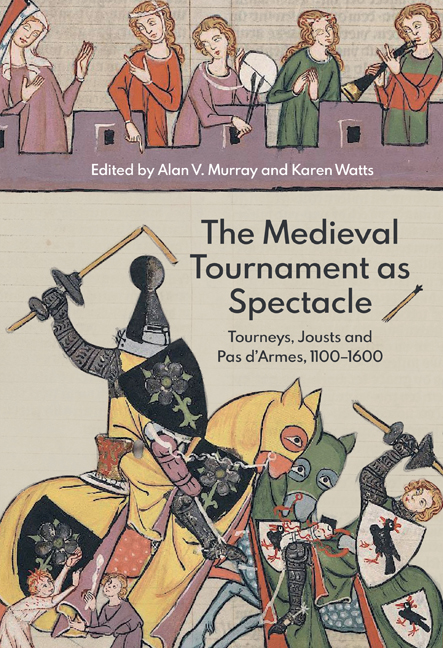Book contents
- Frontmatter
- Contents
- List of Illustrations
- List of Contributors
- Preface and Acknowledgements
- Introduction: From Mass Combat to Field of Cloth of Gold
- Research on the Medieval Tournament (1100–1600): A Select Bibliography
- 1 Now Form Up Close Together! Tactics and Ethos of the Tourney in Early German Sources (Twelfth to Thirteenth Centuries)
- 2 Por pris et por enor: Ideas of Honour as Reflected in the Medieval Tournament
- 3 Richard II of England and the Smithfield Tournament of October 1390: An Instrument to Establish Royal Authority
- 4 Alle myn harneys for the justes: Documents as a Source for Medieval Jousting Armour
- 5 The Tournament Saddle
- 6 Between Sport and Theatre: How Spectacular was the Pas d’armes?
- 7 Art Imitating Life Imitating Art? Representations of the Pas d’armes in Burgundian Prose Romance: The Case of Jehan d’Avennes
- 8 The Foot Combat as Tournament Event: Equipment, Space and Forms
- 9 Power and Pageantry: The Tournament at the Court of Maximilian I
- 10 The Field of Cloth of Gold: Arms, Armour and the Sporting Prowess of King Henry VIII and King Francis I
- Appendix 1 Calendar of the Royal Combats at the Field of Cloth of Gold, June 1520
- Appendix 2 Articles for the Challenge: The Emprise
- Index of Objects
- Index of Manuscripts
- General Index
2 - Por pris et por enor: Ideas of Honour as Reflected in the Medieval Tournament
Published online by Cambridge University Press: 11 September 2020
- Frontmatter
- Contents
- List of Illustrations
- List of Contributors
- Preface and Acknowledgements
- Introduction: From Mass Combat to Field of Cloth of Gold
- Research on the Medieval Tournament (1100–1600): A Select Bibliography
- 1 Now Form Up Close Together! Tactics and Ethos of the Tourney in Early German Sources (Twelfth to Thirteenth Centuries)
- 2 Por pris et por enor: Ideas of Honour as Reflected in the Medieval Tournament
- 3 Richard II of England and the Smithfield Tournament of October 1390: An Instrument to Establish Royal Authority
- 4 Alle myn harneys for the justes: Documents as a Source for Medieval Jousting Armour
- 5 The Tournament Saddle
- 6 Between Sport and Theatre: How Spectacular was the Pas d’armes?
- 7 Art Imitating Life Imitating Art? Representations of the Pas d’armes in Burgundian Prose Romance: The Case of Jehan d’Avennes
- 8 The Foot Combat as Tournament Event: Equipment, Space and Forms
- 9 Power and Pageantry: The Tournament at the Court of Maximilian I
- 10 The Field of Cloth of Gold: Arms, Armour and the Sporting Prowess of King Henry VIII and King Francis I
- Appendix 1 Calendar of the Royal Combats at the Field of Cloth of Gold, June 1520
- Appendix 2 Articles for the Challenge: The Emprise
- Index of Objects
- Index of Manuscripts
- General Index
Summary
The anthropologist Julian Pitt-Rivers defined honour as an individual’s ‘estimation of his own worth, his claim to pride, but it is also the acknowledgment of that claim, his excellence recognized by society, his right to pride’. Frank Stewart Henderson proposed an even simpler definition, describing honour as ‘the right to be treated as having a certain worth’. This ‘right’ must be accepted and acknowledged by others or else the individual will appear contemptible and ridiculous. It must also be protected, even to the point of forcing others to acknowledge it through acts of violence, which Pitt-Rivers described as ‘the ultimate vindication’ of honour. Failure to respond to such a challenge could itself strip the individual of their honour.
Notions of honour also have a powerful normative influence on societies. Through ritual and ceremonial acknowledgement of certain individuals who possess this ‘right’, social and cultural norms are reinforced:
Regardless of private feelings they serve to establish the consensus of the society with regard to the order of precedence; they demonstrate what is acceptable by reference to what is accepted. If the honour felt by the individual becomes honour paid by the society, it is equally the case that the honour which is paid by the society sets the standards for what the individual should feel.
For example, a modern state awarding military medals for gallantry reinforces cultural values of courage, duty and self-sacrifice.
Although Pitt-Rivers and Stewart based their theories on studies of twentieth- century Andalusian and Bedouin culture, respectively, their conclusions provide a useful framework for discussing historical notions of honour. In this essay, I will discuss how the medieval tournament enabled the knighthood of western Europe to establish their ‘right’ to be treated as worthy; that is, to stake their ‘claim to pride’ before their peers. I will discuss the language and phrasing used by contemporary sources to describe honour in the context of a tournament, before considering the specific actions by which individuals or groups could demonstrate or claim honour.
- Type
- Chapter
- Information
- The Medieval Tournament as SpectacleTourneys, Jousts and Pas d'Armes, 1100-1600, pp. 44 - 61Publisher: Boydell & BrewerPrint publication year: 2020



